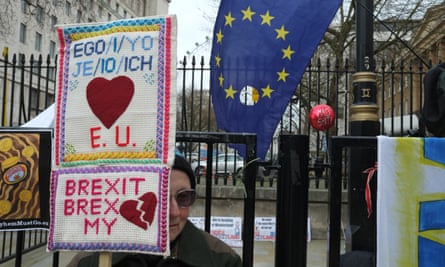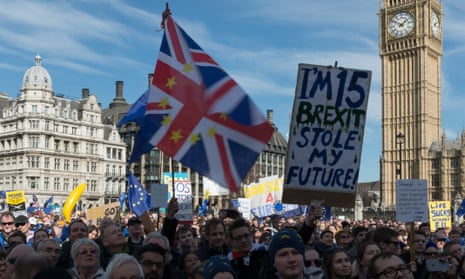In the current state of Brexit politics, I belong to the smallest, saddest, most pessimistic faction. I’m a denialist. Almost a year on, and I’m still shaking my head in disbelief – not a useful political act. I don’t accept this near mystical, emotionally charged decision to leave the EU. I don’t, I can’t, believe it. I reject it.
My faction lives in daily bafflement. How has this happened in a mature parliamentary democracy, this rejection of common sense and good governance? How can it be that in a one-off vote just over a third of the electorate has determined the fate of the nation for the next half century? That shameless lies were told in the Brexit cause? That an advisory referendum has taken on a binding status? That politicians who spoke so recently for the EU now occupy the highest offices in the land and are driving us out. That a gang comprising many angry old men, irritable even in victory, are shaping the future of the country against the inclinations of its youth? That a handful of billionaires lavishly funded the Brexit campaigns for their own financial interests? That, in European Parliament Brexit coordinator Guy Verhofstadt’s words, a catfight within the Tory party got so completely out of hand? That the country, like a depressed teenage self-harmer, takes out a razor to scour a forearm, and now contemplates its own throat?
The Brexit constituency is a broad church. Take a look at the span. It contains on one wing its majority – many decent, concerned people who have made their own decisions derived from anxieties about immigration and the rapid changes it has brought to their localities; or they’ve suffered the harsher edges of globalisation; or they dream of what they think their country once was. Passing along the spectrum, we come to what I would call the Anglican Brexiters – Anglican because they are so close to the atheist remainers one would hardly know the difference. They want a “soft Brexit” – single market, customs union, free movement, European court of justice, big annual contributions – but no agency in shaping EU policy: utterly absurd. Why not be an atheist? Then we come to the current orthodoxy, the “hard” caucus of economic suicides, of no customs union, no single market; they dream of instant, multiple trading treaties around the world whose arbitration clauses will miraculously not mandate courts higher than our own.
Moving along fractionally, we arrive among those who would have us “crash out” of the EU without a deal. As we keep journeying, we find ourselves in the company of those who prefer Robespierre’s grisly trope, “enemies of the people” against dissenting voices, and, of course, against the judiciary. Now we rub shoulders with those who stare out foreigners in the street, who from behind the safety of their computer screens have threatened rape and murder against remainer activists such as Gina Miller. Finally we arrive at the vilest manifestation, those who physically attack people in the street because they speak Polish, those driven by anti-immigrant passion to murder an asylum seeker in the peaceful town of Croydon, or murder a Labour MP because she was making the case for remain. We find ourselves in a new country where it does not seem so very strange for a former leader of the Tory party to speak of war with Spain.

Truly, Brexit has stirred something not heroic or celebratory or generous in the nation, but instead has coaxed into the light from some dark, damp places the lowest human impulses, from the small-minded, the mean-spirited to the murderous.
For all that, the political energy and initiative have been with the Brexiters. What then of the remainers, hobbled by a fatal attraction to rational arguments rather than emotional appeals? We are a vast, peaceable crowd, 16.1 million strong, thoughtful, unhappy, leaderless, with meagre political representation. We don’t threaten rape. As far as I’m aware, no remainer has murdered a Brexiter. Our church, perhaps to its detriment, is not so broad. It is moody, tearful, complaining, sometimes cogently, even beautifully. In general, until now perhaps, it seems to have stoically accepted the process.
If the vote had gone the other way, by the same margin, the leavers would not have crept away to confine themselves to soulful laments. They wouldn’t be conceding that “the people have spoken”, that we must obey the command. No, they would fight on, just as they and their complicit, excitable newspapers have done for more than 40 years since the last referendum. Didn’t we hear Nigel Farage say there would have to be a second referendum if his side lost and the margin was narrow?
A second referendum on the terms of a bad deal, or no deal at all is what we need to concentrate on. Therefore, take another look at article 50. It’s written in plain language. It’s very short. It does not say – in fact it does not even address the matter – that once initiated by a nation, that nation must leave. We should borrow from Isaiah Berlin’s concept of negative liberty and presume that, in an open society, that which is not forbidden is permissible. I agree with the Brexiters who say that no deal is better than a bad deal. But that’s not when we crash out and take our chances with punitive tariffs. That’s when we crash in. And we don’t even have to crash the EU party, because we are and will be already in it.
In this snap election, a progressive alliance is now beyond reach. Labour prefers to hurtle towards disaster – on its own. But in less than two years, a deal will be before us or not done at all. Such an outcome demands general assent.
The complexities of a negotiated Brexit are already apparent; tempers on both sides are already frayed. For inherent, structural reasons, the trumpeted win-win arrangement might be beyond reach. By 2019 the country could be in a receptive mood: 2.5 million over-18s freshly franchised, mostly remainers; 1.5 million of my generation, mostly Brexiters, freshly in our graves. Set aside the negatives – rising inflation, lies about extra billions for the NHS, about “hordes” of Turks and so on. The EU, especially now with a Macron presidency, will be in the mood for reform and tighter eurozone integration: a perfect moment to revive the plan for a two-speed Europe.
Many of us believe the EU remains the most extraordinary, ambitious, liberal political alliance in recorded history. It has overseen unprecedented peace and prosperity for 70 years. It is the dream trading bloc, to which we still have privileged access. Against the historical background of centuries of bloodshed, it is a heroic project, the closest embodiment on the planet of an open, free-thinking, tolerant polity forged between nations once at war. At the same time, it has preserved national differences – take a drive from Slovenia to Lisbon or Lübeck. At the human and cultural level, the EU is far richer, more diverse and benignly complex than the continental US. Where it needs reform, where it needs to evolve, we should be there to help turn that heavy wheel.
Developments these past 20 years have shown us that liberal democracy is not an inevitable development after all, but instead occupies a narrow bandwidth on the global political spectrum. And as the separate experiences of France, Britain, the US, Poland and Hungary show, liberal democracy is frail, in need of constant renewal to ensure a more even distribution of the benefits. The EU project is under tremendous pressure: a hostile Russia, a less friendly US, a migration crisis, irrational populist movements which offer opportunities to the ambitious demagogue. Brexit will be a gruesome addition to these woes.
If Europe falls to the old, vicious nationalisms, history suggests that Britain will also suffer, and be drawn into bloody entanglements as we have been so many times before. Good reason not to give up. It’s a heartening feature of our civic society that so many groups are now taking up the fight – signing up younger voters, offering guidance on tactical voting – and a great shame that the Labour party will not lead the way on this. This is a parliamentary democracy. Our parliament, once so determined to remain, has let us down. Labour remains uselessly ambivalent. Too many remainer Tory MPs prefer power and party cohesion to principle. The Liberal Democrats have been staunch but their base is tiny.
But a pro-European civil society is now clearly ready to fight for what it believes. This week we hope for but probably won’t get the sceptical, scrutinising parliament we should have. But by 2019, in the event of a crash-out deal or a terrible deal, we could have a sceptical electorate and a worried parliament amenable to pressure for a second-look referendum. Ignore the Brexiters who tell us daily that “the people have spoken”. These are the same Brexiters who appear mortally afraid to let the people speak again. A negotiated settlement needs to be set before the nation for its consideration. If there’s no deal, let’s crash in, not out. Let the people speak – again!










